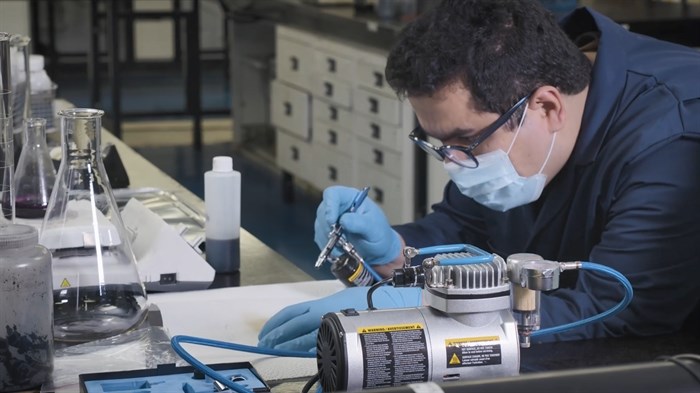
Kelowna researcher, Dr. Seyyedarash Haddadi is being recognized for his work in developing a graphene oxide-based material to use as a mask coating to prevent the transmission of the COVID-19 virus.
Image Credit: SUBMITTED/Mitacs
November 23, 2021 - 6:00 PM
A researcher at the University of British Columbia Okanagan is receiving accolades for a breakthrough face mask coating to prevent the transmission of the COVID-19 virus.
Dr. Seyyedarash Haddadi was exploring anticorrosion coatings when the pandemic hit and he quickly applied his research towards virus prevention by creating an antiviral material for masks, according to a media release. He has won the Mitacs & NRC-IRAP Award.
Through his research, Haddadi invented a low-cost, and effective antimicrobial fabric coating made from a graphene oxide and silver combination, that is now being incorporated into masks worldwide.
“The final product is made from a silver-coated graphene oxide sheet, less than one nanometer in thickness, that we disperse in water and then spray on the surface of fabrics,” Haddadi said in the release.
The coating is safe for consumer use as no solvents or toxic chemicals are added to the compound.
“When we apply it to an average four-ply face mask, we coat the inner layer so that nothing is on the exterior of the mask,” Haddadi said.
Working with partner Zentek, and under the direction of Dr. Colin van der Kuur in a Guelph, Ontario-based lab, Haddadi discovered that covering thin sheets of patent-pending oxidized graphene with silver resulted in antiviral and antibacterial properties.
“Further testing showed that his invention, incorporated in a surgical mask, reduces transmission of active pathogens by more than 99.99 per cent, including COVID-19 viral particles and bacteria,” reads the release.
Haddadi received approval from Health Canada in late September and Zentek made the first commercial sale of the coating and plans to launch the four-ply mask.
Zentek will also invest $6 million to build a manufacturing facility to produce the coating and coated materials for up to 800 million antimicrobial face masks per month by early next year.
“After announcing our invention, we heard from many companies around the world who are interested in partnering with us to test and use this coating on their fabrics,” Haddadi said. “One gram of material is sufficient to coat 300 masks, making this a very affordable large-scale solution."
Haddadi is grateful for the opportunity to study in Canada and that the Mitacs funding has made his research possible.
“Mitacs helped me commercialize my research in two important ways. First, as a graduate from university in Iran, Mitacs introduced me to research and industry in Canada, and secondly, the stipend Mitacs provided enabled me to focus on my research and discovery so I didn’t have to find a second job and could focus on developing my research,” he said.
Mitacs CEO John Hepburn explained the importance of giving Canadian innovators the opportunities for skill development through partnerships between industry, government, and schools while congratulating the winners.
“Collaborative innovation is a proven and productive approach to research that ultimately helps to deploy top talent within the Canadian economy,” Hepburn said in the release. “Whether our researchers develop ground-breaking ideas by tapping into resources across our country or through international collaboration, their breakthrough work is benefitting all Canadians, and it’s this talent that is shaping the future of innovation.”
To contact a reporter for this story, email Emily Rogers or call 250-718-0428 or email the editor. You can also submit photos, videos or news tips to the newsroom and be entered to win a monthly prize draw.
We welcome your comments and opinions on our stories but play nice. We won't censor or delete comments unless they contain off-topic statements or links, unnecessary vulgarity, false facts, spam or obviously fake profiles. If you have any concerns about what you see in comments, email the editor in the link above.
News from © iNFOnews, 2021